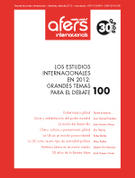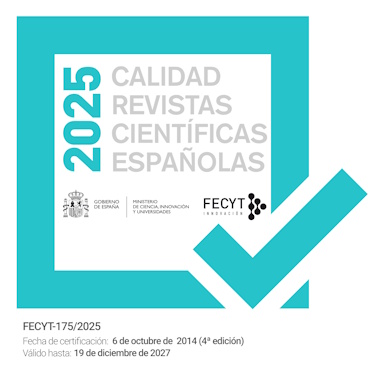Cultura y pensamiento global: una teoría china de las relaciones internacionales
Culture and global thought: Chinese international theory in the making
Keywords:
China, international relations, culture, paradigms, globalisationAbstract
Revista CIDOB d’Afers Internacionals, nº 100
Quadrimestral (December 2012)
ISSN:1133-6595 | E-ISSN:2013-035X
In this article, the author examines the study of international relations in China, a discipline that has proliferated as the country has opened up to the rest of the world. He examines the three main trends of international thought that have become most widespread: the first, which the author calls the obverse approach, situates Chinese thought as the theoretical basis for considering a genuine worldism, thanks to traditional concepts such as Tianxia and Confucian family bonds. Secondly, there is the reverse approach, which applies Western theoretical paradigms to the concept of power in ancient Chinese thinkers; this is a theory that emphasises the hierarchy of the international system and seeks international Chinese dominance. Finally, the third is more interactive, and which constructs an intercultural, thoughtful and critical dialogue, at the same time as applying autochthonous conceptual frameworks such as Confucian relationism, and foreign ones, such as rationalism.
>> The full text articles of this issue are available only in Spanish language
References
Acharya, Amitav. «How Ideas Spread: Where Norms Matter? Norm Localization and Institutional Change in Asian Regionalism». International Organizations, n.º 58 (2008).
Adler, Emanuel. «Europe as a Civilizational Community of Practice», en: Katzenstein, Peter (ed.) Civilizations in World Politics: Plural and Pluralistic Perspectives. London and New York: Routledge, 2010.
Bell, Daniel. «Introduction», en: Xuetong Yan. Ancient Chinese Thought, Modern Chinese Power. Princeton: Princeton University Press, 2011.
Buzan, Barry. «China in International Society: Is ‘Peaceful Rise’ Possible?». The Chinese Journal of International Politics, vol. 3, n.º 1 (2010).
Dyer, Jeffery H. y Singh, Harbir. «The Relational View: Cooperative Strategy and Source of Interorganizational Comparative Advantage». Academy of Management Review, vol. 23, n.º 4 (1998).
Feng Youlan. Selected Philosophical Writings of Feng Youlan. Beijing: Foreign Language Press, 1991.
Hoffmann, Stanley. «An American Social Science: International Relations», en: Der Derian, James (ed.) International Theory: Critical Investigation. New York: New York University Press, 1995.
Huang Guangguo. Rujia Guanxi Zhuyi: Wenhua Fansi yu Dianfan Chongjian (Relacionismo confuciano: reflexiones culturales y reconstrucción de un modelo). Beijing: Peking University Press, 2006.
Johnston, Alastair Iain. «The State of International Relations Research in China: Consideration for the Ford Foundation», en: Ford Foundation. International Studies in China: A Review of Ford Foundation Past Grant-making and Future Choice (2002).
Kang, David. China Rising: Peace, Power, and Order in East Asia. New York: Columbia University Press, 2007.
Keohane, Robert. After Hegemony: Cooperation and Discord in World Political Economy. Princeton: Princeton University Press, 1984.
Krasner, Stephen. (ed.). International Regimes. Ithaca: Cornell University Press, 1983.
Liu Xiaogan. «Fanxiang Geyi’ yu Zhongguo Zhexue Yanjiu de Kunjing– yi Laozi Zhidao de Quanshi Weili» (Un dilema de la interpretación analógica reversa. Ejemplos de estudios de Lao-Tsé). Journal of Nanjing University (Philosophy, Humanities and Social Sciences), n.º 2 (2006), p. 76-90.
Mearsheimer, John. «Back to the Future: Instability in Europe after the Cold War». International Security, vol. 15, n.º 1 (Summer 1990).
– «Why We Will Soon Miss the Cold War». The Atlantic (1990). Milner, Helen. Interest, Institutions, and Information: Domestic Politics and
International Relations. Princeton, N.J.: Princeton University Press, 1997.
Morgenthau, Hans J. Politics among Nations: Struggle for Power and Peace, 3ª ed. New York: Alfred A. Knopf, 1961.
Poppo, Laura y Zenger, Todd. «Do Formal Contracts and Relational Governance Function as Substitutes or Complements». Strategic Management Journal, vol. 23, n.º 8 (2002).
Qin Yaqing y Wei Ling. «Structure, Process, and the Socialization of Power: East Asian Community Building and the Rise of China», en: Ross, Robert y Feng Zhu (eds.). China’s Ascent: Power, Security, and the Future of International Relations. Ithaca y London: Cornell University Press, 2008.
Qin Yaqing. Guanxi yu Guocheng: Zhongguo Guoji Guanxi Lilun de Wenhua Jiangou (Relaciones y procesos: construcción cultural de la teoría china de las relaciones internacionales). Shanghai: Shanghai People’s Publishing House, 2012.
– «Rule, Rules, and Relations: Toward a Synthetic Approach to Global Governance». The Chinese Journal of International Politics, vol. 4, n.º 2 (2011).
– «International Society as a Process: Institutions, Identities, and China’s Peaceful Rise». The Chinese Journal of International Politics, vol. 3, n.º 2 (2010).
– «Zhongguo Guoji Guanxi Lilun» (Desarrollo de la teoría de las relaciones internacionales en China), en: Wang Yizhou (ed.). Zhongguo Duiwai Guanxi Zhuanxing 30 Nian: 1978-2008 (Relaciones Internacionales en China: una transformación en 30 años, 1978-2008). Beijing: Shehui Kexue Wenxian Chubanshe (Social Science Document Press), 2008.
– «Why Is There No Chinese International Relations Theory». International Relations of the Asia Pacific, vol. 7, n.º3 (2007).
Rigmur, Eric. «Performing International Systems: Two East Asian Alternatives to the Westphalian Order». International Organization, n.º 66 (2012).
Ruggie, John Gerard (ed.). Multilateralism Matters: The Theory and Praxis of an Institutional Form. New York: Columbia University Press, 1993.
Tin-Bor Hui, Victoria. War and State Formation in Ancient China and Early Modern Europe. Cambridge: Cambridge University Press, 2005.
Tu Weiming. Zhongyong Dongjian (Una vision del Zhongyong). Beijing: People’s Publishing House, 2008.
Waltz, Kenneth. Theory of International Politics. Boston: Addison-Wesley, 1979. Wang Jisi. «International Studies in China Today: Achievements, Trends, and Conditions: A Report to the Ford Foundation», in: Ford Foundation. International Relations in China: A Review of Ford Foundation Past Grant-making and future Choices (2002).
Wendt, Alexander. Social Theory of International Politics. Cambridge: Cambridge University Press, 1999.
Yan Xuetong. «Why Is There no Chinese School of International Relations Theory?», en: Yan Xuetong. Ancient Chinese Thought, Modern Chinese Power. Princeton: Princeton University Press, 2011.
– Zhongguo Zhengduo Daoyi Zhigaodian Xue Jiejiao Mengyou (China necesita formar alianzas para competir por la dominación de la cumbre de la moralidad): http://view.news.qq.com/a/20111208/000021_1.htm (Consultado el 20 de agosto de 2012).
Yan Xuetong y Song Xuefeng. Guoji Guanxi Yanjiu Shiyong Fangfa (Métodos prácticos de estudios internacionales). Beijing: Renmin Chubanshe (People’s Publishing House), 2001.
Zhao Tingyang. «Making the World into All-under-heaven (Tianxia)», en prensa, citado con la autorización del autor a partir de su manuscrito.
– A World without a Worldview: Political Philosophy and Cultural Philosophy. Guilin: Guangxi Normal University Press, 2005.
– TianxiaTixi: Shijie Zhidu Zhexue Daolun (El sistema Tianxia: una introducción a la filosofía de las instituciones mundiales). Nanjing: Jiangsu Jiaoyu Chubanshe (Jiangsu Education Press), 2005.
Zheng Zhou, Kevin; Poppo, Laura y Yang Zhiling. «Relational Ties or Customized Contracts? An Explanation of Alternative Governance Choices in China». Journal of International Business Studies, vol. 39, n.º 3 (2008).













